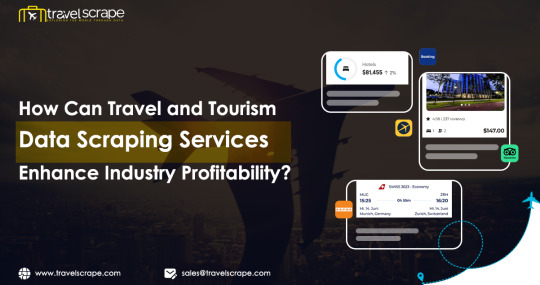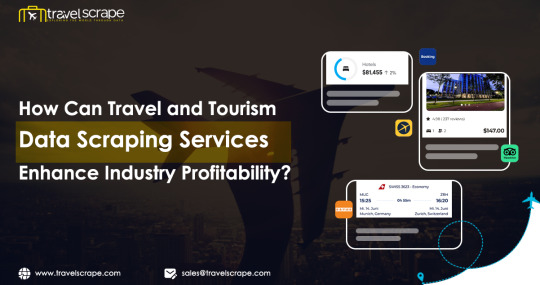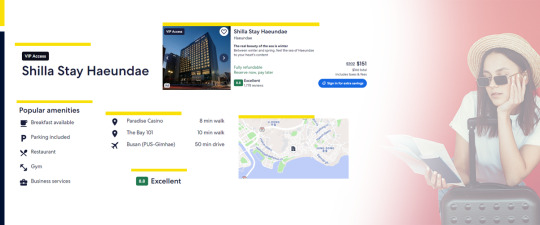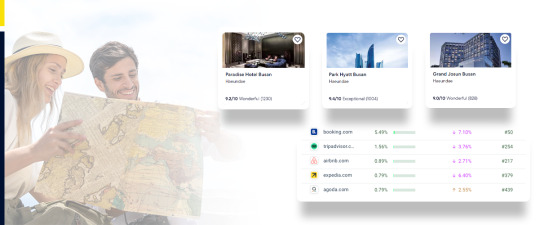#ScrapeTravelAndTourismData
Explore tagged Tumblr posts
Text
Web Scraping For Travel And Tourism - Destination Reviews & Ratings
Introduction
The travel and tourism industry thrives on the opinions and experiences of travelers. With an ever-growing number of travelers sharing their reviews and ratings on various platforms, businesses and researchers can gain invaluable insights into destinations, services, and trends. This is where web scraping for travel and tourism comes into play. By leveraging technology to extract travel and tourism scraping API data, businesses can analyze customer feedback, monitor trends, and make data-driven decisions. In this blog, we'll explore the benefits and methodologies of web scraping in the travel industry, focusing on collecting destination reviews and ratings.
Understanding Web Scraping for Travel and Tourism
Travel and tourism site data scraping services involves using automated tools to extract data from websites. In the context of the travel and tourism industry, it can help gather information from various sources like travel forums, review sites, and travel booking platforms. The extracted data can include reviews, ratings, prices, availability, and more. This information is crucial for understanding customer sentiment, analyzing competitors, and offering better services.
Key Benefits of Web Scraping in the Travel Industry
Data-Driven Decision Making:
Web scraping enables businesses to collect vast amounts of data that can be analyzed to understand customer preferences and market trends. This helps in making informed decisions regarding pricing, marketing strategies, and service improvements.
Real-Time Data Collection:
One of the significant advantages of travel and tourism data collection service is the ability to collect real-time data. This is particularly useful for monitoring pricing trends, availability of services, and customer feedback, enabling businesses to respond promptly to market changes.
Comprehensive Market Analysis:
By collecting data from multiple sources, businesses can gain a comprehensive view of the market. This includes understanding competitor strategies, identifying popular destinations, and discovering emerging travel trends.
Enhanced Customer Experience:
Analyzing reviews and ratings allows businesses to identify areas for improvement. Understanding what customers appreciate or criticize helps in enhancing the overall customer experience.
How to Scrape Travel and Tourism Data?
To effectively scrape travel apps & hotel data, one needs to follow a systematic approach. Below are the key steps involved:
Identify Data Sources:
The first step is to identify the websites and platforms from which data will be extracted. These may include travel booking sites, review platforms, travel blogs, and forums. Popular sites include TripAdvisor, Booking.com, Expedia, and Yelp.
Define Data Points:
Determine the specific data points to be extracted. For collecting destination reviews and ratings, the focus would be on user reviews, star ratings, user profiles, timestamps, and other relevant details.
Choose the Right Tools:
Various tools and libraries are available for web scraping. Python, with libraries like BeautifulSoup, Scrapy, and Selenium, is a popular choice due to its versatility and ease of use. Additionally, businesses can use specialized travel and tourism scraping API data services for more complex data extraction needs.
Develop or Use Existing Scraping Scripts:
Depending on the complexity of the task, you can either develop custom scraping scripts or use existing ones. Custom scripts offer more flexibility, while existing ones can save time and effort.
Data Storage and Processing:
Once data is scraped, it needs to be stored and processed. Depending on the volume, data can be stored in databases or data lakes. Data processing involves cleaning, transforming, and organizing data for analysis.
Data Analysis and Visualization:
The final step is to analyze the data. This can involve sentiment analysis, trend analysis, and competitor benchmarking. Data visualization tools like Tableau, Power BI, or custom dashboards can help in presenting the insights in an easily understandable format.
Challenges in Web Scraping for Travel and Tourism
While web scraping offers numerous benefits, it also comes with challenges:
Legal and Ethical Considerations:
It is crucial to adhere to legal and ethical standards while scraping data. This includes respecting website terms of service and avoiding the collection of personally identifiable information without consent.
Dynamic and Complex Websites:
Many travel websites use dynamic content and complex structures, making data extract tourist places & travel data challenging. Techniques like rendering JavaScript, handling CAPTCHA, and managing sessions may be required.
Data Quality and Consistency:
Ensuring the quality and consistency to scrape travel apps & hotel data is vital. This involves dealing with issues like duplicate entries, missing data, and inconsistent formats.
Rate Limiting and IP Blocking:
Websites often implement rate limiting and IP blocking to prevent scraping. Using rotating IPs, respecting website crawl rate limits, and implementing retry mechanisms can mitigate these issues.
Applications of Web Scraping in Travel and Tourism
The data collected through web scraping can be used in various ways:
Travel Data Intelligence:
Businesses can leverage travel data intelligence to gain insights into customer behavior, preferences, and market trends. This helps in crafting targeted marketing campaigns and improving service offerings.
Pricing and Availability Monitoring:
Monitoring competitors' pricing and availability in real-time allows businesses to adjust their strategies accordingly. This is particularly useful for dynamic pricing models.
Customer Sentiment Analysis:
By analyzing reviews and ratings, businesses can gauge customer sentiment and identify areas for improvement. Sentiment analysis can also help in predicting customer behavior and preferences.
Product and Service Development:
Understanding the needs and preferences of travelers helps in developing new products and services. For example, identifying a growing interest in eco-friendly travel options can lead to the development of related packages.
Competitor Analysis:
Web scraping can provide valuable insights into competitor strategies, including pricing, promotions, and customer feedback. This information is crucial for staying competitive in the market.
The Future of Web Scraping in Travel and Tourism
As technology evolves, so do the methods and applications of web scraping. The integration of AI and machine learning with web scraping is expected to revolutionize the way data is collected and analyzed. AI-powered scraping tools can automate complex tasks to extract tourist places & travel data, identify patterns, and provide deeper insights into customer behavior.
Moreover, the increasing use of travel apps and mobile platforms presents new opportunities for travel app data extraction. With more travelers using mobile apps to book flights, accommodations, and activities, scraping data from these platforms can provide a wealth of information.
Additionally, the rise of new technologies like blockchain and decentralized platforms may impact how data is accessed and used in the travel industry. As these technologies develop, businesses must stay abreast of changes and adapt their travel and tourism data collection service strategies accordingly.
Conclusion
Travel app data extraction is a powerful tool for the travel and tourism industry, offering insights into customer preferences, market trends, and competitor strategies. By collecting and analyzing destination reviews and ratings, businesses can enhance customer experiences, make data-driven decisions, and stay competitive in a rapidly evolving market. However, it is essential to navigate the legal and ethical challenges associated with web scraping and ensure data quality and consistency.
As the industry continues to evolve, leveraging travel and tourism site data scraping services and integrating advanced technologies will be crucial for businesses looking to gain a competitive edge. Whether it's monitoring pricing trends, analyzing customer feedback, or developing new products, web scraping for travel and tourism can provide invaluable insights and drive business success.
Partner with Datazivot for expert web scraping solutions and unlock the full potential of travel and tourism data. Contact us today to learn more!
Know More:- https://www.travelscrape.com/web-scraping-for-travel-and-tourism-destination-reviews-and-ratings.php
#WebScrapingForTravelAndTourism#ScrapeTravelAndTourismData#ExtractTravelAndTourismData#TravelAndTourismDataScraper#TravelAndTourismDataCollection#TravelAndTourismDataSets
0 notes
Text
How Can Travel and Tourism Data Scraping Services Enhance Industry Profitability?
Optimize travel experiences with travel and tourism data scraping services, unlocking insights for personalized services, cost reduction, and enhanced customer value.
Know more>>https://www.travelscrape.com/travel-and-tourism-data-scraping-services.php
#TravelandTourismDataScrapingServices#ScrapeTravelandTourismData#TravelandTourismDataExtraction#TravelandTourismDataCollectionServices#ExtractTravelandTourismData
0 notes
Text

Optimize travel experiences with travel and tourism data scraping services, unlocking insights for personalized services, cost reduction, and enhanced customer value.
Know more>>https://www.travelscrape.com/travel-and-tourism-data-scraping-services.php
#TravelandTourismDataScrapingServices#ScrapeTravelandTourismData#TravelandTourismDataExtraction#TravelandTourismDataCollectionServices#ExtractTravelandTourismData
0 notes
Text
How Can Travel and Tourism Data Scraping Services Enhance Industry Profitability?

The global travel and tourism sector, integral to the service industry in many nations, significantly fuels economic growth and job creation. Technological advancements have strengthened the bond between service providers and consumers. With online ticket booking and reviews, tourists increasingly engage directly with service providers, reducing reliance on agencies. Platforms like Trivago for hotel price comparison and OTAs like Booking have gained popularity. However, social media, like Facebook and Instagram, influence choices for the 18-34 age group. In this dynamic landscape, data-driven insights become crucial for tracking trends, understanding customer preferences, and adapting to industry shifts, with travel and tourism data scraping services emerging as a valuable tool for information gathering. The industry's transition to a more technical focus underscores the importance of data in staying relevant and offering enhanced services, whether a travel agency, homestay, airline company, or review site, embracing scraping travel data proves beneficial in navigating and thriving in this evolving ecosystem.
List of Data Fields

Destination Information:
Names of popular destinations
Geographic coordinates (latitude, longitude)
Descriptions and attractions
Pricing and Booking Data:
Flight prices
Hotel rates
Rental car prices
Vacation package costs
Availability and Scheduling:
Flight schedules
Hotel room availability
Rental car availability
Customer Reviews and Ratings:
Reviews for hotels, flights, and attractions
Ratings and feedback from travelers
Weather Information:
Current weather conditions at destinations
Historical weather data for planning
Travel Trends and Insights:
Popular travel times
Peak seasons
Emerging travel trends
Promotions and Deals:
Special promotions and discounts
Limited-time offers
Accommodation Details:
Hotel amenities
Room types and features
Flight Details:
Airline information
Aircraft types
Flight durations
Geographical Data:
Maps & geographic information systems (GIS) data for destinations
Event and Festival Information:
Upcoming events and festivals at destinations
Travel Regulations and Requirements:
Visa information
Entry requirements
Revolutionizing Tourism with Data Scraping: Adapting to the Digital Age

As the internet transformed travel needs, direct interaction with service providers became prominent, requiring travelers to engage with multiple sources for an ideal plan. Traditional methods of manually collecting and maintaining information became impractical, leading to the widespread adoption of data scraping in the tourism industry. Agencies now effortlessly access service providers' sites, gathering crucial data on prices and offers. The surge in agency competition fueled a need for monitoring competitors, predicting trends, and data-driven decision-making. Efficient travel data scraper ensures accurate, cost-effective data, empowering agencies to analyze competitors, track deals, and align their strategies with market preferences, ultimately paving the way for success in this changing sector.
Navigating Travel Data through Web Scraping: Crafting Competitive Strategies

Web scraping travel and tourism data involves:
Parsing specific travel and tourism sites.
Extracting relevant text data.
Organizing it into a structured format for efficient database integration.
The scraper, regularly updated to adapt to site changes, captures the agency's data and retrieves information from competitors' websites for comparative analysis. This comparative format empowers agencies to scrutinize competitors' performance, including package prices, offers, and discounts, ensuring they remain aligned with market dynamics.
Going beyond, the data gleaned allows for intricate analyses, unveiling market preferences such as seasonal city preferences, famous hotels, and preferred cost ranges. This profound understanding of the tourism market enables agencies to track demands, estimate optimal pricing, strategically structure deals for maximum profitability, and stay competitive and responsive to evolving market trends.
Valuable Travel Insights through Data Scraping: Unveiling Opportunities

Discovering scrapable data for the travel industry becomes seamless when tapping into the information travelers share on social media. Approximately 70% of travelers update their vacation experiences on Facebook, while 40%-45% contribute reviews on hotels, local attractions, and restaurants. Further enriching the data pool are details from online purchases, GPS coordinates, and other user-generated content. This collective information forms a comprehensive data warehouse encompassing:
Hotel Listings: Scrape travel data to help agencies glean details such as room pricing, seasonal room availability, and promotional features. By analyzing hotel prices and foot traffic during different seasons, agencies can tailor competitive deals, attracting customers and ensuring profitability.
Location Data: This category encompasses information on new or upcoming hotels and rentals, providing insights into evolving travel landscapes.
Feedback Data: Tourist feedback and reviews from platforms like TripAdvisor, Expedia, and Yelp serve as a valuable resource for travelers and agencies, with approximately 43% relying on reviews when exploring new destinations.
Travel Data: Airline and railway ticket fares, shortest routes, and timestamps offer critical insights for online travel agencies, airlines, and marketers. With access to such data, agencies can personalize tour packages based on traveler demands and budget constraints, while airlines strategically plan and offer vacation deals during peak footfall periods.
Conclusion: As of 2017, a report emphasized the synergy between the digital realm and the tourism sector, projecting heightened profits. Adopting a data-driven strategy that tailors services to individual tourists has resulted in a cumulative industry value of $265 billion. This comprehensive figure spans various facets, including the industry's overall value derived from migration patterns, cost efficiency, amplified societal value through job creation, and elevated customer value with significant time and monetary savings. The integration of digital technologies enhances operational efficiency and contributes substantively to the travel industry's economic, social, and experiential dimensions, shaping it into a more lucrative and consumer-centric landscape.
We specialize in scraping travel data at Travel Scrape, mainly focusing on Travel aggregators and Mobile travel app data. Our services empower businesses with enriched decision-making capabilities, providing data-driven intelligence. Connect with us to unlock a pathway to success, utilizing aggregated data for a competitive edge in the dynamic travel industry. Reach out today to harness the power of scraped data and make informed decisions that set your business apart and drive success in this highly competitive landscape.
Know more>>https://www.travelscrape.com/travel-and-tourism-data-scraping-services.php
#TravelandTourismDataScrapingServices#ScrapeTravelandTourismData#TravelandTourismDataExtraction#TravelandTourismDataCollectionServices#ExtractTravelandTourismData
0 notes